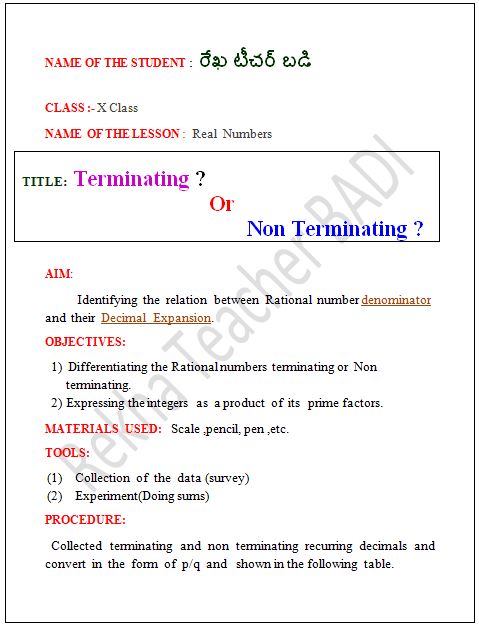Dec 4, 2017
Nov 10, 2017
MathsProjectsF3 Telugu
1) 6 వ తరగతి- నా తరగతి కాలపట్టిక
Download Project
2) 7 వ తరగతి- నా తరగతి కాలపట్టిక పటచిత్రము
Download Project
3) 8 వ తరగతి- నా బుల్లి ఇల్లు వైశాల్యం
Download Project
4) 9 వతఠగతి నిత్య జీవితములో జ్యామితి
Download Project
5) 10 వతఠగతి నా పుట్టినరోజు కేకు
DOwnload Project
MathsProjectsF3
1)10th class - My birth day Quadratic cake
Download Project
2) 9th class - Geometry in Real Life
Download Project
3) 8Th class - My tiny house Area
Download Project
4) 7th class - Fractions Division Hunt
Download Project
5) 6th class - Butterfly Addition & subtractions of fractions
Download Projects
6)Preparing Questions for all classes
Aug 18, 2017
Maths Projects F2
1) 6th class - Angles in Clock
2)7th class - Transversal
3)8th class - Maths Beauty in Nature “Goldenratio”
4)9th class - Statistics in My class
5)10th class - Areas & correponding sides Relation
6)Preparing Questions for all classes
Maths Projects F2 Telugu
1) 6th class-నా పేరు లోని కోణములు
2)7th class- గడియారంలో కోణములు
3)8th class-“గోల్డెన్ రేషియో
4)9th class- నా తరగతి లో సాoఖ్యాక శాస్త్రము
5)10th class- సరూప త్రిభుజ వైశాల్యములు-వాటి అనురూపభుజము
6)Preparing Questions for all classes
Aug 17, 2017
Maths Xth Class Projects
CLASS :- X Class
NAME OF THE LESSON : Real Numbers
TITLE: Terminating ? Or Non Terminating ?
AIM: Identifying the relation between Rational number denominator and their Decimal Expansion.
OBJECTIVES:
1) Differentiating the Rational numbers terminating or Non terminating.
2) Expressing the integers as a product of its prime factors. MATERIALS USED: Scale ,pencil, pen ,etc.
TOOLS: (1) Collection of the data (survey) (2) Experiment(Doing sums)
PROCEDURE: Collected terminating and non terminating recurring decimals and convert in the form of p/q and shown in the following table.
Download Projects
NAME OF THE LESSON : Real Numbers
TITLE: Terminating ? Or Non Terminating ?
AIM: Identifying the relation between Rational number denominator and their Decimal Expansion.
OBJECTIVES:
1) Differentiating the Rational numbers terminating or Non terminating.
2) Expressing the integers as a product of its prime factors. MATERIALS USED: Scale ,pencil, pen ,etc.
TOOLS: (1) Collection of the data (survey) (2) Experiment(Doing sums)
PROCEDURE: Collected terminating and non terminating recurring decimals and convert in the form of p/q and shown in the following table.
Download Projects
Maths Projects 9th CLass
NAME OF THE LESSON :- Real Numbers
TITLE :- Rational ~ Irrational
AIM :-
Identifying all the numbers on the Real number line.
OBJECTIVES :-
(1) Observing Terminating decimals
(Rational numbers)
(2) To know about Non terminating Recurring decimals.
(Rational numbers)
(3) Identifying Non terminating Non recurring decimals
(Irrationals)
TOOLS :-
1) Collected Integers,Fractions. (survey method)
2) Experiment (Ploting numbers and Identifying numbers on
the Real number line)
PROCEDURE :-
Collected different types of Integers,Fractions and convert into
decimal form . Classified them and prepared a table.
AIM :-
Identifying all the numbers on the Real number line.
OBJECTIVES :-
(1) Observing Terminating decimals
(Rational numbers)
(2) To know about Non terminating Recurring decimals.
(Rational numbers)
(3) Identifying Non terminating Non recurring decimals
(Irrationals)
TOOLS :-
1) Collected Integers,Fractions. (survey method)
2) Experiment (Ploting numbers and Identifying numbers on
the Real number line)
PROCEDURE :-
Collected different types of Integers,Fractions and convert into
decimal form . Classified them and prepared a table.
Maths 8th Class Projects
CLASS :- VIII Class
NAME OF THE LESSON : Rational numbers
AIM: Identifying the differences between Fraction and Rational
Numbers.
OBJECTIVE: 1)To know about fractions.
2)To know about Rational numbers.
MATERIAL USED: Scale , pencil ,pen etc ...
TOOLS: Collection of the data (Survey method)
PROCEDURE: The definition of fraction is taken from VI and VII
class Maths text books.
Download PROJECTS
NAME OF THE LESSON : Rational numbers
AIM: Identifying the differences between Fraction and Rational
Numbers.
OBJECTIVE: 1)To know about fractions.
2)To know about Rational numbers.
MATERIAL USED: Scale , pencil ,pen etc ...
TOOLS: Collection of the data (Survey method)
PROCEDURE: The definition of fraction is taken from VI and VII
class Maths text books.
Download PROJECTS
Maths-6th-class-Project
CLASS :- VI Class
NAME OF THE LESSON : Knowing your Numbers
AIM:- To know about the properties & different types of NUMBERS
OBJECTIVES: 1)To know about Natural numbers,Whole
numbers,prime numbers,composite numbers.
MATERIALS USED: Scale ,pencil, pen ,etc.
TOOLS: Survey based project(collection)
Download Projects
NAME OF THE LESSON : Knowing your Numbers
AIM:- To know about the properties & different types of NUMBERS
OBJECTIVES: 1)To know about Natural numbers,Whole
numbers,prime numbers,composite numbers.
MATERIALS USED: Scale ,pencil, pen ,etc.
TOOLS: Survey based project(collection)
Download Projects
Aug 9, 2017
Apr 4, 2017
IMPORTANCE OF Learning by Doing
Through Learning
by Doing the child invents
mathematical knowledge from her or his actions on objects, so direct, concrete
experiences with many objects at the child’s developmental level are crucial to
the formation of accurate concepts. They
construct their own knowledge of mathematics using concrete materials and
natural situations . When students have opportunities to solve problems through
doing, they develop multiple sensing pathways in the brain . If preschool
children engage in a significant amount of mathematically related play. This
mathematical play would include exploring patterns and shapes, comparing
objects according to size, and developing a sense of number. As a child
matures, mathematically related play becomes problem solving, and children
solve problems by creating models and using those models to communicate their
understanding. if we could help children
to build upon and extend the intuitive modeling skills that they apply to basic
problems as young children, we would have accomplished a great deal by way of
developing problem-solving abilities in children in the primary grades. modeling provides a framework in problem
solving .
The
importance of building on prior mathematical understanding, and the essential
fact that children learn mathematics primarily through “… doing, talking,
reflecting, discussing, observing, investigating, listening, and reasoning”
Subscribe to:
Posts (Atom)



















